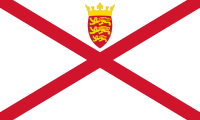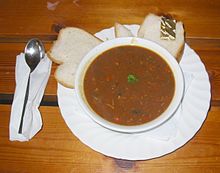Jersey people
Jèrriais | |
|---|---|
 | |
| Regions with significant populations | |
46.4% self-identify as ethnic Jersey people[1] | |
| Languages | |
| |
| Religion | |
| Traditionally Christianity | |
| Related ethnic groups | |
|
The Jersey people (Jèrriais: Jèrriais; French: Jersiais) also referred to as Islanders, are an ethnic group and nation native to the island of Jersey in the Channel Islands who share a common history, Norman ancestry and culture. There is no standard demonym for Jersey people, however common demonyms include Jerseyman/Jerseywoman[2] or Jèrriais. Jersey people are colloquially known as 'beans', after the Jersey bean crock - a traditional meal,[3] or crapauds (the Jèrriais word for toad), the reason being that Jersey has toads and Guernsey does not.[4] There is a statue in St. Helier of a toad, known as Le Crapaud.[4] The Jersey toad is a unique species, which are bigger, breed earlier and use different habitats than English toads.[5]

Population[]
Jersey is the largest and most populous island of the Channel Islands, an archipelago near the coast of France that is part of the British Isles. Jersey is a British Crown dependency and is not part of the United Kingdom of Great Britain and Northern Ireland.
Census[]
In the most recent 2011 Jersey census, 46.4% or 45,379 people self-identified their ethnic origins as Jersey, a numerical increase of 790 people over the 2001 census.[1]
Jersey diaspora[]
There is a Jersey diaspora in a number of places. Some went to live in Canada as part of the Norman-Canadian community, especially during the early stages of colonialism. By 1837, there were an estimated 1237 Jersey people living in Canada. Jèrriais was widely spoken, surviving in Canada until the mid-20th century. Channel Islanders seemed to benefit from more education than the other locals and gained many positions in local politics and government. The Gaspé-Jersey-Guernsey Association is dedicated to the collection of artefacts, documents and other information about the history of Channel Island settlers on the Gaspé coast.[6]
There were modest Jersey settlements in the American colonies in the 17th century, driven by religion, trade and a wish to escape from poverty. Settlement was concentrated in and around Boston. John Cabot was born in Jersey in 1580 and moved out to Salem. His descendants include a number of US Senators and John Kerry, former US Secretary of State.[6] An example of a famous person of Jersey descent in North America is Buffalo Bill. The North American Cody family is descended from Philip Le Caudey. who came to Massachusetts from the island.[7] One of his descendants was William Cody, a bison hunter and soldier better known as Buffalo Bill.[8]
Jersey people have also emigrated to Great Britain. In the 1901 census in England and Wales, it is estimated that 12,000 people living there were Jersey-born. During World War II, due to the Occupation of Jersey, many Jersey people became refugees in England. In many places, Channel Island Societies were established to help refugee islanders keep in touch with each other (and to a limited extent with their occupied homeland). Many chose to emigrate from Jersey permanently after .[6]
Otherwise, many young Jersey people have left the island since the 19th century, seeking education or employment opportunities elsewhere (particularly in the UK). [6]
The Government of Jersey is making attempts to support links between the Jersey diaspora and their home nation. For example, the GoJ London Office has created the 'Always Jersey' programme, which encourages Jersey émigrés to register to keep in touch with the island.[9]
Language[]
The traditional language of the Jersey people is Jèrriais, a form of Norman French native and unique to the island. In more recent times, this has been surpassed by English, which is now the main language spoken by Jersey people.[1]
Culture[]
The culture of Jersey is a mixture Franco-British culture, however modern Jersey culture is dominated by British cultural influences.
Cuisine[]

Bean crock (les pais au fou) is a slow-cooked pork and bean stew, most authentically containing a pig's trotter, water and onions. In the past the dish was so ubiquitous that English-speaking visitors, purporting to believe that the people of Jersey ate nothing else, dubbed the inhabitants Jersey beans.[10]
References[]
- ^ a b c "2011 Census Report" (PDF). 2011. Retrieved 21 August 2021.
- ^ "Jerseyman definition and meaning | Collins English Dictionary". www.collinsdictionary.com. Retrieved 2021-05-11.
- ^ "Bean name-calling 'unlikely' to spark racism tribunals". BBC News. 2014-08-31. Retrieved 2021-05-12.
- ^ a b "Did you know?". Visit Jersey. 2017-03-23. Retrieved 2021-05-11.
- ^ "Jersey toad is unique species, say experts". BBC News. 2014-10-09. Retrieved 2021-05-11.
- ^ a b c d Mark, Boleat. Population of Jersey (PDF).
- ^ "ICFA Home Page". www.cody-family.org. Retrieved 2021-05-11.
- ^ "From Jersey to New Jersey". jerseyeveningpost.com. Retrieved 2021-05-11.
- ^ "Always Jersey". Government of Jersey London Office. 2017-03-28. Retrieved 2021-06-11.
- ^ "Bean Crock (Un Poit et des Pais au Fou)". bbc. Retrieved 21 August 2021.
- People of Jersey descent